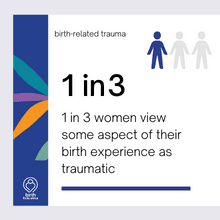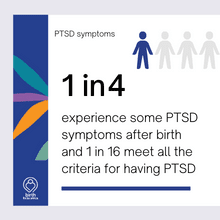Post-Traumatic Stress Disorder in the Postpartum Period
On this page, you will find information about Post Traumatic Stress Disorder (PTSD) following pregnancy and birth, including possible causes, common symptoms, treatment options and where to find support.
PTSD is a mental health condition that can develop after experiencing birth-related trauma. No one else can tell you that your experience was not traumatic or “bad enough” that you were traumatised. If you felt that your birth experience was traumatic, then it was.
Experiencing birth as a traumatic event can be confusing. Unlike other traumatic experiences like war or sexual assault, society typically views birth and early parenthood as a happy time. These expectations contribute to difficulties in understanding when someone has found their journey to parenthood traumatic.
Research linking birth-related trauma and PTSD remains fairly limited at this stage, but you can find some published articles on our ‘Birth Trauma Research‘ page.
1 in 3 women


1 in 4 women
Anyone can experience birth-related trauma, including:
- women/people giving birth
- fathers and non-birthing parents
- friends or family supporting the birth
- others witnessing a birth, including health professionals.
Birth-related trauma isn’t isolated to the event of birth alone. Trauma can occur anytime during the perinatal period during the journey to parenthood, such as when trying to get pregnant ‘reproductive trauma’, during pregnancy when some women experience conditions such as hyperemesis gravidarum, preeclampsia, gestational diabetes, placenta previa or a ‘prenatal diagnosis’, during labour and birth and in the period after the birth.
Donate via PAYPAL Today
Related Links
Trauma is an individual experience
Just as everybody responds differently to difficult situations, people are unique in how they react to trauma. Many factors contribute to the development of PTSD following birth experiences. You may be at increased risk of PTSD after the birth experience if, during birth or soon after, you felt:
Fear
Forced
Consent
Heard
That you were not listened to or respected
Alone
Pain
That you experienced significant pain
You may also be at increased risk of PTSD if you have experienced the following:
- Complications affecting you or your baby during pregnancy, childbirth or soon after
- Prior mental health conditions
- History of trauma such as sexual assault or abuse
- Previous perinatal loss, such as stillbirth or miscarriage
- Low levels of emotional or practical support during childbirth or after the baby is born.
PTSD in the postpartum period is more common than most people realise. For some, symptoms of trauma may be diagnosed as depression or anxiety. For others, ongoing symptoms may not be recognised until some months or even years after the birth – you may have done the best you can to manage them until they become too challenging to cope with. Some people may not even realise that they have trauma until they are pregnant or trying to conceive.
It’s important to note that PTSD in the postnatal period is not the same as postnatal depression or anxiety and should be treated differently.
PTSD Symptoms during the Postpartum Period
Re-experiencing the traumatic event
- Intrusive and fearful memories of labour, birth and the immediate period following birth
- Flashbacks to the birth experience or feeling as though you are relieving a ‘play by play’ of the birth
- Nightmares
- Feeling distressed, panicked, or anxious around things that remind you of your birth
Avoidance behaviours
- Trying to avoid thinking or talking about the birth
- Using strategies to distract or numb self
- Avoiding places, people or activities that remind you of your birth experience
- Feeling unattached or having a hard time bonding with your baby
Negative thoughts and feelings
- Negative thoughts about yourself, others and the world as a direct result of the birth
- Feelings of anger at those who were in the room with you e.g. your birth partner
- A sense of overwhelming guilt or shame
- Difficulty remembering important parts of the birth
- Feeling detached from others and difficulty maintaining relationships
- No longer interested in activities that were previously enjoyed
- A lack of positive emotion
Feeling a heightened sense of threat
- Being easily startled (fearful)
- Feeling alert or on guard
- Impulsive and reckless behaviour e.g. driving dangerously, drinking or using drugs without concern for the consequences
- Having difficulty with sleeping (not related to baby) and concentration
- Feeling irritable and having anger outbursts
PTSD Treatment Information
Treating PTSD during the postnatal period requires specialist care. If you are experiencing any of the above symptoms, please seek help from a trusted health professional.
There are a number of effective treatments for PTSD that may be recommended for you by your health professionals. These may include:
- trauma-focused cognitive behavioural therapy (CBT) – this is where you identify and challenge negative thoughts in relation to the traumatic experience, process memories and reduce unhelpful strategies or coping behaviours
- eye movement desensitisation and reprocessing (EMDR) – this is a type of therapy where you are guided to move your eyes in a certain way which supports the processing of trauma memories
- antidepressant medication – this is medication you may be prescribed to help with depression or anxiety symptoms
Some members of the BTA community have also reported the following holistic approaches to also be helpful as an addition to their treatment:
- mindfulness and compassion focussed therapies; addressing feelings of guilt or shame surrounding your experience
- somatic therapies – focuses more on how the body reacts during a traumatic experienc
Many people will benefit from using a range of different approaches. It is a matter of finding the combination that works most successfully for you as an individual.
What is important is that you are able to build a safe and secure relationship with your mental health professional, as trauma work usually requires weekly or bi-weekly sessions over several months.
‘Word of mouth’ recommendations can be useful when searching for a health professional or service to support you. Speaking with other parents either through your mothers’ group or on forums can also be very helpful.
BTA’s Peer2Peer Support Group is a safe space to connect with other mums and birthing people that have experienced birth-related trauma and ‘get it’.
Reading our ‘What is Birth Trauma’ page will also give you some starting points for getting the support you may need from family and friends and for the discussion with a healthcare professional.

